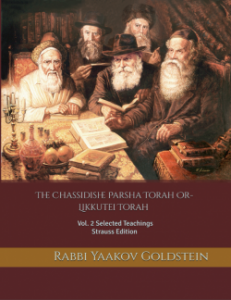Importance of learning Torah at night:[1] It is a Biblical Mitzvah and command to learn Torah both by day and night.[2] Furthermore, one must be careful in his Torah study at night even more than during the day, and one who is not careful in this, his punishment is great.[3] […]
Davening to Hashem to grant one the attribute of Bitachon
Davening to Hashem to grant one the attribute of Bitachon:[1] The attribute of Bitachon has the power to draw blessing for the matter in which one is trusting in. For example, if one trusts in Hashem that he will find a good Parnasa, then even if he does not currently […]
With which foot is one to take three steps back after Shemoneh Esrei?
With which foot is one to take three steps back after Shemoneh Esrei?[1] When one takes three steps back after Shemoneh Esrei, he is to begin with his left foot.[2] A lefty:[3] One who his is left footed[4] is to begin with his right foot when he takes three steps […]
Washing hands if wearing nail polish
Is nail polish considered a Chatzitza for washing hands for bread and in the morning?[1] Women who are accustomed to dye their hands for beauty purposes, and the like, the dye is not considered an interval [between the water and the hand] and the washing is valid. This applies even […]
May one Daven or learn while hearing the voice of a woman
Hearing the voice of a woman during learning or Davening:[1] The singing[2] voice of a woman is [Rabbinically[3]] an Erva.[4] This applies whether she is single[5] or married, and even towards the voice of one’s own wife [even while she is pure[6]].[7] [This applies to woman of all ages, whether […]
The general prohibition of Erva during Davening and learning Torah
This article is a first draft summary of the Shulchan Aruch Harav and is pending further review of additional sources. The general prohibition of Erva: Biblical prohibition of seeing Erva:[1] It is Biblically forbidden for one to pray or learn Torah within sight of feces or an Ervah which is […]
Every marital union creates new souls
Every union creates new souls:[1] Every marital union between a husband and wife which takes place in a form of holiness creates a Jewish soul. This soul, may enter the body of another child who is born, if that woman does not become pregnant with the soul that they created. […]
The spiritual children of Avraham and Sarah
The spiritual children of Avraham and Sarah:[1] The Zohar explains that although Sarah was physically barren, she merited to have many spiritual children. This is learned from the verse which states “Vethi Sarah Akarah, Ein Lah Velad/And Sarah was barren, she had no children.” This means that although she did […]
May one recite Birchas Hamazon in English and other languages?
The language-May one recite Birchas Hamazon in English and other languages?[1] Birchas Hamazon may be recited in any language [that he understands, as will be explained].[2] Practically, however, the custom is to recite Birchas Hamazon in Lashon Hakodesh, even if he does not understand the language [as will be explained].[3] […]
Understanding the words of Birchas Hamazon & the preferred language it is be said in
Understanding the words of Birchas Hamazon & the preferred language it is be said in:[1] Birchas Hamazon may be recited in any language [that he understands, as will be explained].[2] However, if one does not know the meaning of the words that he is saying in Birchas Hamazon, such as […]



 Donate
Donate